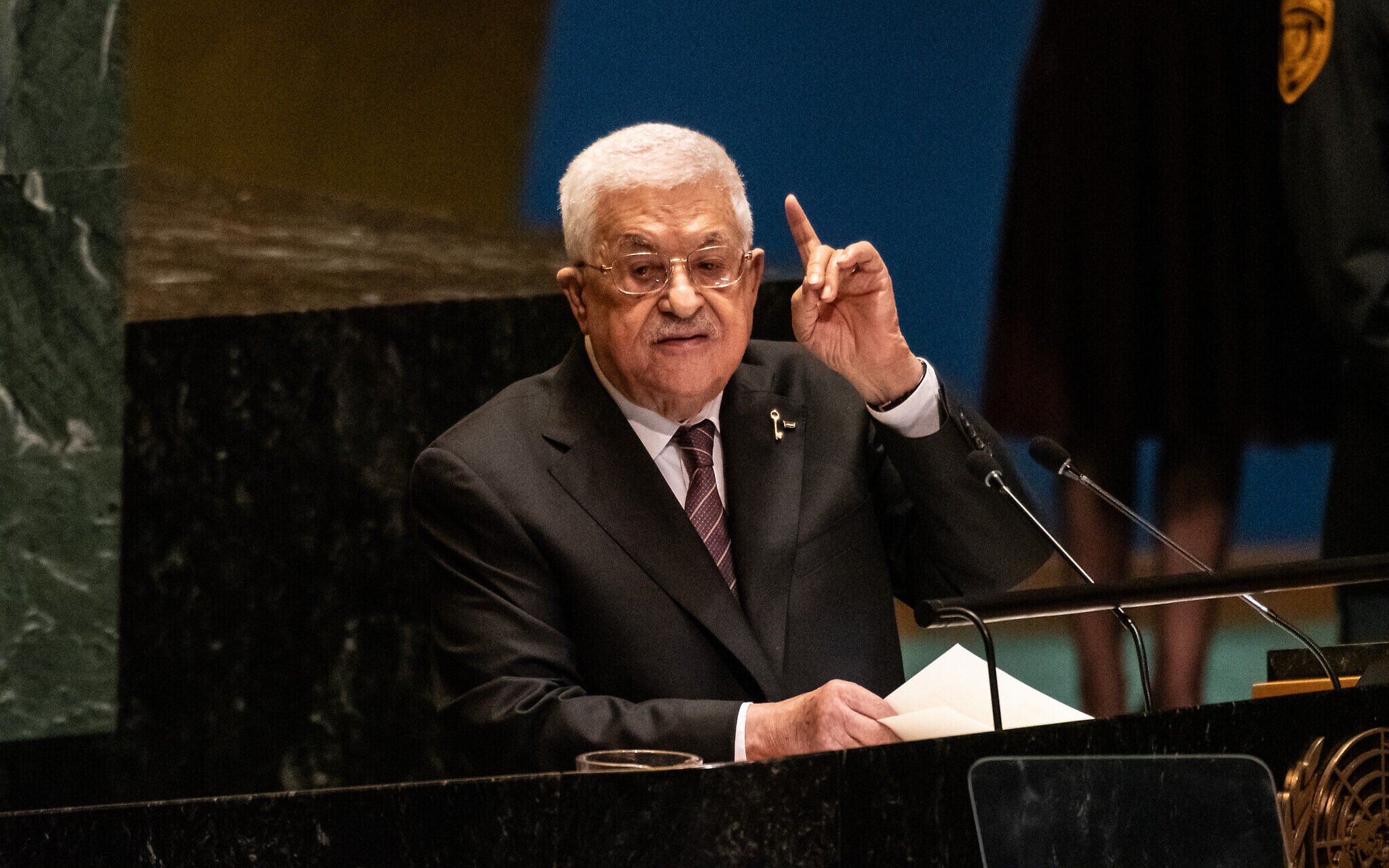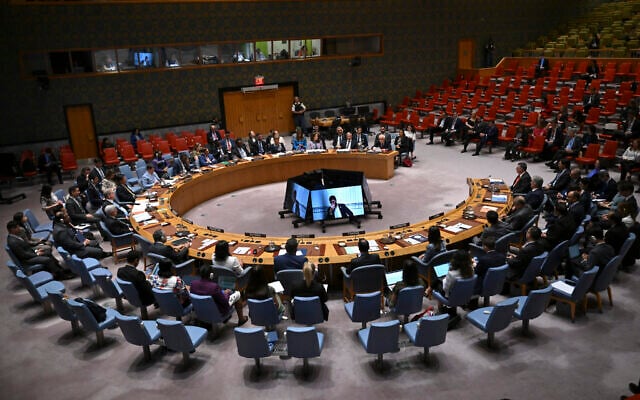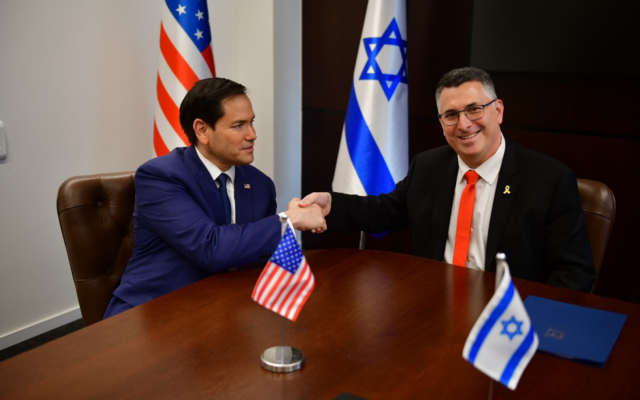



The US State Department announced Friday that Secretary of State Marco Rubio was denying and revoking visas from Palestinian officials ahead of next month’s United Nations General Assembly.
The unprecedented step came a month after the State Department first announced that it would pursue the policy, which it now appeared to be implementing.
The US announcement did not name which individuals would be barred and if Palestinian Authority President Mahmoud Abbas was among them, though the New York Post cited an internal US State Department memo recommending that the visa ban be applied to him.
Explaining the seemingly unprecedented move, the State Department announcement said, “It is in our national security interests to hold the Palestine Liberation Organization and the Palestinian Authority accountable for not complying with their commitments, and for undermining the prospects for peace.”
Palestinian Ambassador to the UN Riyad Mansour told reporters in response that his office was still checking exactly what the US move meant “and how it applies to any of our delegation, and we will respond accordingly.”
Abbas’s office did not immediately respond to a request for comment.
Under an agreement with the UN, the US is required to allow representatives of member states, officials working on behalf of the United Nations and those who received invitations to visit UN headquarters in New York City without hindrance. The State Department said it was in compliance with those requirements as it would still allow Palestinian diplomats already based in New York to attend the event by granting them visa waivers.
While the UN General Assembly recognizes a state of Palestine, it is designated as a non-member observer like the Vatican.
The US previously restricted the movement of foreign officials from adversarial countries such as Russia, Iran and North Korea but didn’t ban them completely.
In 1988, the US denied a visa to then-PLO leader Yasser Arafat, but this was before Israel recognized the PLO during the 1993 Oslo Accords.
As a result of the 1988 ban, the UN moved a planned General Assembly session from New York to Geneva so Arafat could speak.
“Before the PLO and PA can be considered partners for peace, they must consistently repudiate terrorism — including the October 7 massacre — and end incitement to terrorism in education, as required by US law and as promised by the PLO,” the US statement said.
Abbas did condemn the Hamas-led October 7, 2023, attack for the first time in June after facing intensive Israeli criticism for refusing to do so.
Unlike the July 31 State Department announcement previewing the move, Friday’s statement did not mention the PA’s controversial welfare program that included payments to the families of security prisoners based on the length of their prison sentence. No explanation was given for the removal. Abbas had signed a decree in February ending the policy and replacing it with a new one, which the PA has begun implementing and invited the US to certify is now in place, though the Trump administration has yet to send a delegation to Ramallah.
The State Department did not immediately respond to a request for comment on the change.
“The PA must also end its attempts to bypass negotiations through international lawfare campaigns, including appeals to the International Criminal Court and International Court of Justice, and efforts to secure the unilateral recognition of a conjectural Palestinian state,” the State Department statement continued.
“Both steps materially contributed to Hamas’s refusal to release its hostages, and to the breakdown of the Gaza ceasefire talks,” the statement claimed.
Rubio has said France’s decision to recognize a Palestinian state led Hamas to raise its demands in hostage negotiations, which collapsed the talks on July 24. But an Arab diplomat and a second source involved in the negotiations told The Times of Israel that Hamas’s new demands were submitted several hours prior to French President Emmanuel Macron’s announcement that Paris would recognize a Palestinian state at the UN General Assembly in September.
Israel’s Ambassador to the UN Danny Danon told The Times of Israel in an interview this week that France was the party leading the latest drive for countries to recognize a Palestinian state, not the PA.
The State Department statement ended by saying that the “US remains open to reengagement that is consistent with our laws, should the PA/PLO meet their obligations and demonstrably take concrete steps to return to a constructive path of compromise and peaceful coexistence with the State of Israel.”
The US decision was hailed by Foreign Minister Gideon Sa’ar, who thanked Rubio for holding the PA and PLO “accountable for rewarding terrorism, incitement and efforts to use legal warfare against Israel.
The foreign minister, who met with Rubio in Washington this week, said the Trump administration was “standing by Israel once again” with the “bold step.”
Axios reported that Sa’ar had encouraged Rubio to take the step during their meeting in Washington earlier this week.
The announcement appeared to be the first relatively punitive step that Washington has taken in response to France, the UK and Canada advancing Palestine recognition plans — a move encouraged by Ramallah. The Trump administration, for now, appears to prefer punishing Ramallah directly, as going after more powerful Western governments may be more difficult. However, Trump did float blowing up trade talks with Canada over its decision.
The denial of visas also appeared to be the most limited of four steps that the Trump administration had at its disposal if the PA was found in violation of 2002 legislation that requires the president to assess whether Palestinian entities are fulfilling their commitments to combat terrorism and support peace with Israel.
The more forceful option that the US could have taken was to designate the PA as a foreign terrorist organization, which would have exposed Ramallah to crippling sanctions.
Pressed on whether the US would also take steps against Israel, given that it is widely seen to be in violation of its commitments under the Oslo Accords due to its rampant settlement expansion, failure to withdraw from the West Bank and withholding of over $2 billion in Palestinian tax revenues, the State Department declined to comment on the matter last month. Unlike with the PA and PLO, there is no US law that provides the president with the tools to sanction Israel over such violations.
The PLO is the internationally recognized representative of the Palestinian people and oversees the Western-backed PA, to which Israel granted limited autonomy in less than half of the West Bank. Abbas has led both entities for two decades after being democratically elected in 2005, but has refused to hold elections since. He pledged earlier this year to hold elections in 2026.
The PA has been under pressure from Arab and Western states to undergo significant reform as they push for the body to replace Hamas as Gaza’s governing authority. Prime Minister Benjamin Netanyahu has ruled out a future role for the PA in governing Gaza, but has failed to advance any alternative amid pressure from his far-right partners who want to establish settlements in the Strip.
Times of Israel staff contributed to this report.


